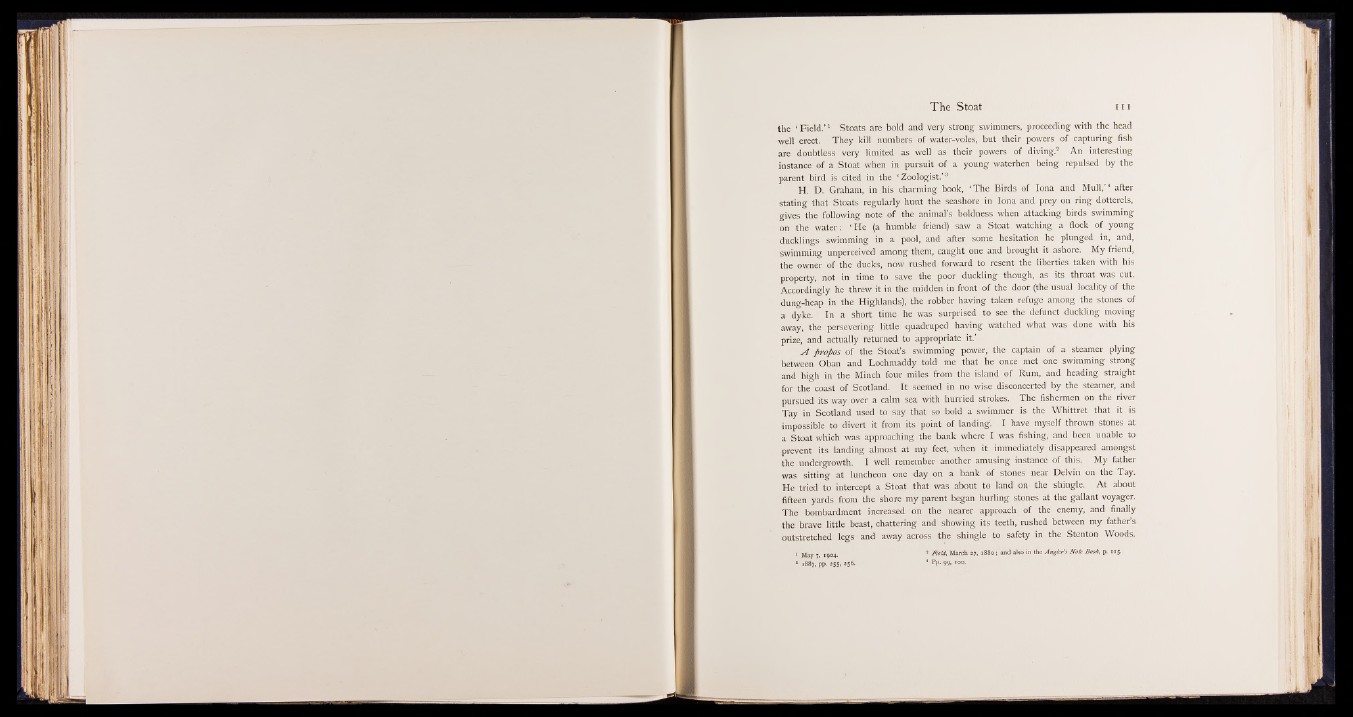
the 1 Field.’ 1 Stoats are hold and very strong swimmers, proceeding with the head
well erect. They kill numbers of water-voles, but their powers of capturing fish
are doubtless very limited as well as their powers of diving.’ An interesting
instance of a Stoat when in pursuit of a young waterhen being repulsed by the
parent bird is cited in the ‘ Zoologist.’ 8
H. D. Graham, in his charming book, 'The. Birds of Iona and Mull,’ 1 after
stating that Stoats regularly hunt the seashore in Iona and prey on ring dotterels,
gives the following note of the animal’s boldness when attacking birds swimming
on the water: ‘ Hef?(a humble friend) saw a Stoat watching a flock of young
ducklings swimming in a pool, and after some hesitation he plunged in, and,
swimming unperceived among them, caught one and brought it ashore. My friend,
the owner of the ducks, now rushed forward to resent the liberties, taken with hi J
property, not in time to save the poor duckling though, as its throat was cut.
Accordingly he threw it in the midden in front of the door (the usual locality of the
dung-heap in the Highlands): the robber having taken refuge among the stones of
a dyke. In a short time he was surprised to see the defunct duckling moving
away, the persevering little quadruped having watched what w asH jne with his
prize, and actually returned to appropriate it.’
A firopos of the' Stoat’s swimming power, the captain of a steamer plying
between Oban and Lochmaddy told me that he once met one swimming: strong
and high in the Minch four miles from the island of Rum, and heading straight
for the coast of Scotland. It seemed in no wise disconcerted by the steamer, and
pursued its way over a calm sea with hurried strokes. The fishermen on the river
Tay in Scotland used to say that ..so bold a swimmer is the Whittret that it j jp
impossible to divert it from its point of landing! I have myself thrown stones at
a Stoat which was approaching the bank where I was fishing, and been unable to
prevent its landing almost at my feet, when it immediately disappeared amongst
the undergrowth. I well remember another amusing instance of this. My father
was sitting at luncheon one day on a bank of stones near Delvin on the Tay.
He tried to intercept a Stoat that was about to land on the shingle. At about
fifteen yards from the shore my parent began hurling stones at the gallant voyager.
The bombardment increased on the nearer approach of the enemy, and finally
the brave little beast, chattering and showing its teeth, rushed between my father's
outstretched legs and away across the shingle to ^safety in the Stenton Woods.
1 May y, 1904.
* 1887, pp. 255, 256.
* Field, March 27, 1880 j and also in the Angler’s Note Book, p. 115.
4 Pp. 99, 100.